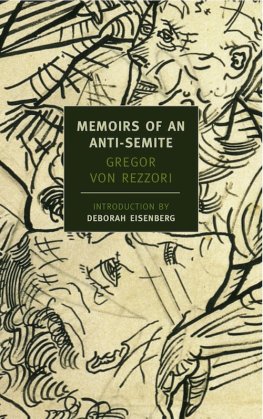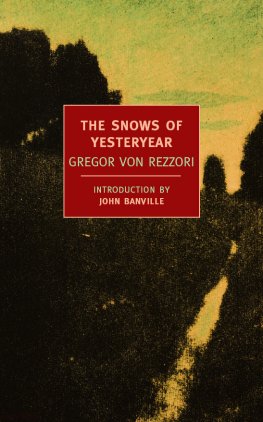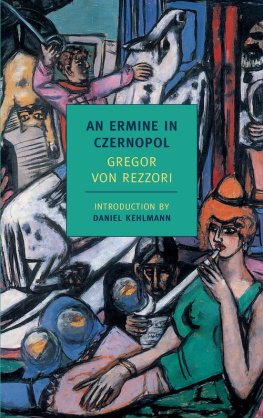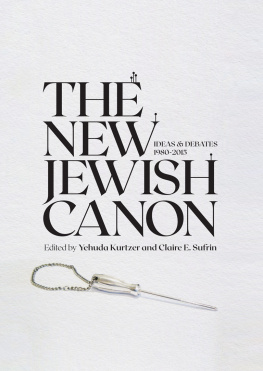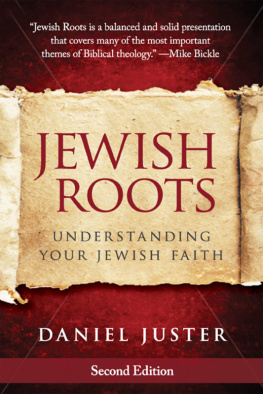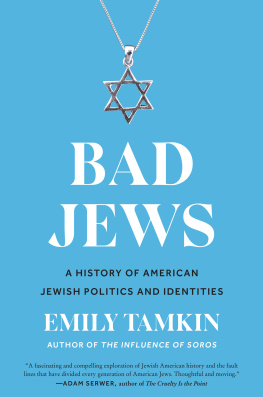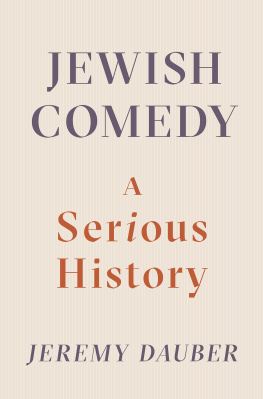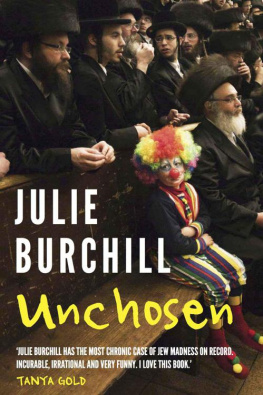Gregor von Rezzori
Memoirs of an Anti-Semite
The friend who introduced me to Ivan Turgenevs short novel First Love, characterized it as a beautiful thing thats made out of ugly things, and it has occurred to me since that a substantial quotient of ugliness may well be integral to all truly beautiful literary works. In any case, there can be few books rooted in a more profound ugliness than Gregor von Rezzoris Memoirs of an Anti-Semite, which so vividly, so feelingly, so elegantly, with such tender care, anarchic humor, and shocking honesty portrays the crucible of Central Europe during the first half of the twentieth century, with its catastrophically toxic compound of cultural elements and historical impulses.
Rezzori was born in 1914 in the Bukovina, and he preserves in print, in this and other books, the immense vitality of the region at that time the linguistic and ethnic ferment, the vast, brooding landscapes lit by the fading glow of the Austro-Hungarian Empire, the borderland combustibility. As a young man, Rezzori also spent time in Vienna, where he studied and had family, in Bucharest, and in Berlin, and he can cause those cities to spring to life on a page with such intense immediacy that you can practically drink the coffee and eat the pastry.
Memoirs of an Anti-Semite was first published in its entirety in German, in 1979, but the story Troth, which the polyglot author wrote in English, appeared ten years earlier in The New Yorker under the title Memoirs of an Anti-Semite. And although the book was written decades after World War II, most of it is set in the preceding years, along the road to that war.
The cultural life of Germany and Central Europe in the 1910s, 20s, and 30s burns so brightly against its dark background that for many of us who werent there it has the force of thwarted memory, of something that grieving is straining to reinstate. And the art of the period music, film, painting, architecture, and literature with its probing, uneasy, anticipatory qualities, seems to be straining forward for some sort of information or resolution from the far side of the immense blood-filled trench that violently severs one part of history from another.
It is sickeningly clear to us, now, just what is about to happen back then, on the other side. And yet, though the abyss yawns conspicuously in their path, the people walking around in that particular past seem nearly oblivious. Why, why on earth dont they watch where theyre going?
The names of certain years are like tolling bells that announce not only the horrors each contains, but also the greater ones to come: 1919the Treaty of Versailles; 1923the apex of hyperinflation in Germany; 1933the Reichstag fire, which enabled Hitler to seize power by declaring a state of emergency; 1935the Nuremberg Laws, which stripped German Jews of citizenship; 1938Anschluss, the annexation of Austria into the German Reich; Kristallnacht, the state-sponsored pogrom against Jews throughout the Reich; 1939the German invasion of Poland; 1942the Wannsee Conference, at which the program was devised to eradicate all Jews by means of extermination camps.
And of course between these years and within each of them, there are the myriad new rules, decrees and laws, economic and social events, and developments within the Church as well as within the medical and academic establishments, all of which were to signify in the ensuing immolation of a large part of the world.
The incremental contributions to the intertwined catastrophes the war and the attempted genocide of the Jews continue to be sifted and scrutinized. And there are many contemporaneous reports available to us. We have a number of astonishing witnesses accounts from people who were soon to be murdered and from some who, against all likelihood, evaded murder. And we have the Nazis hair-raisingly meticulous records of their programs, policies, and deeds, their triumphal speeches and exhaustive propaganda. There are also some superb diaries and memoirs by people like Sebastian Haffner and Missy Vassiltchikov, who could perfectly well have led successful lives within the Third Reich but who instead dedicated themselves to opposing it.
But with all this wealth of documentation, one thing that we have very little insight into is what it felt like to be someone who managed somehow to remain relatively unaffected by and relatively unconcerned with the governments darkening shadow. What about the person who was managing just to go about his or her business? What might such a person have been experiencing at each turn, at each of the moments that, in retrospect at least, appear as so starkly significant?
Once a great public cataclysm has occurred, it is nearly impossible for people to recall what it is they felt and how they behaved during it or just prior to it. Misery is a potent aid in obliterating memory, and shame in distorting it. The minds mandate is to interpret, and even in the most routine course of things the mind confects a stance codifies, retroactively, reactions and attitudes; interpretation springs instantaneously from experience, but interpretation is inherently inaccurate.
Perhaps Rezzoris most astounding coup in this book is to keep his narrators consciousness severely restricted to the moment it is experiencing, his tone pristinely untouched by the readers (and authors) indelible awareness of the conflagration about to engulf entire populations. The stories are told from some unspecified present about a younger self. Yet throughout those sections of the book set before the war, there is no stain of hindsight sanctimony, apology, self-exoneration, regret, or even sobriety regarding the shattering events that are soon to follow. It is a fastidious exploration of a psyche in circumstances that became extraordinary, and it sheds more light on murderous and suicidal human irrationality than any other single work Ive encountered. It is also however troublingly deliriously funny and a virtuoso literary performance.
The complexities of the books title alone, the tangled and ambiguous colorations brutal, nostalgic, formal, comedic, goading, confessional put one off-balance and on guard before one even reaches the subtitle: A Novel in Five Stories, itself arrestingly equivocal.
Id assume this choice of subtitle was at least in part a marketing decision: novels are more saleable than stories, never mind that the book is not really a novel at all. On the other hand, neither is the book exactly a collection of stories. The sections, each of which is complete in itself, are, in fact, related though its hard to say exactly how; theyre certainly not related in any way that free-standing segments of a novel might be expected to be related.
The first and last sections of the book have Russian titlesSkushno and Pravda. Skushno, were told immediately, is difficult to translate. It means more than dreary boredom: a spiritual void that sucks you in like a vague but intensely urgent longing. Pravda, on the other hand, we can all easily translate, and yet as exemplified, for instance, by the famous Soviet newspaper from whose name most of us know the word whether it actually means anything is debatable.
What impels the books first section toward the dubious, fragmented goal of the last, expresses itself variously in the course of the intervening stories as a longing for ones childhood landscape source and symbol of ones integration into the universe the longing for something to believe in, the longing for something to be loyal to, the longing for something to be: childish and adolescent longings, the longings of the pure in heart romantic, innocent, and noble. Or so they seem to those who hold or extol them. But under Rezzoris unflinching gaze the sentimental haze evaporates from around them and we watch notions of loyalty and identity degrade into little more than fertile soil for the cultivation of hatred.

